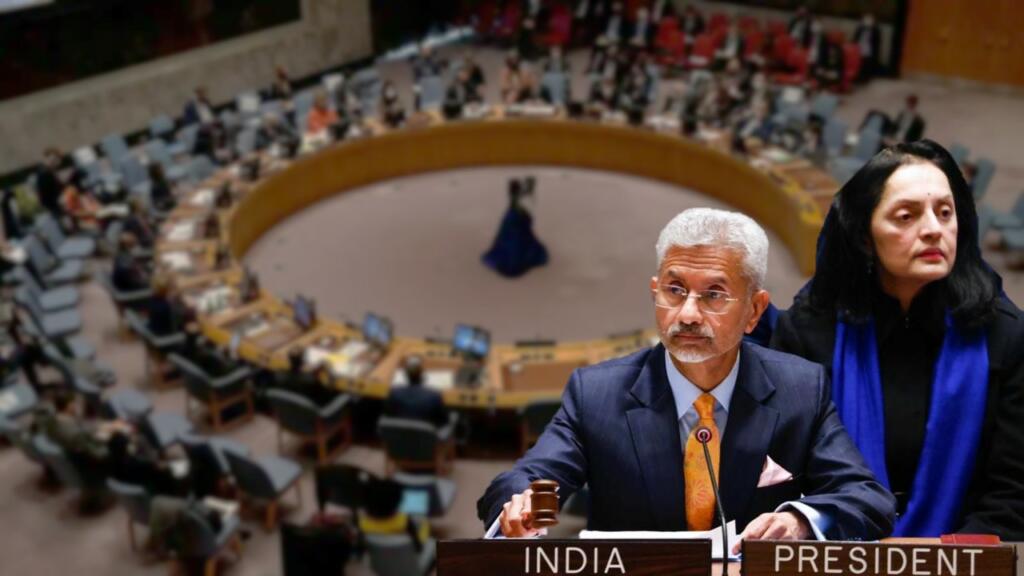In a democracy, the lead of any multilateral agency is expected to work like a clerk looking after constituents. It is not that the President does not have the power to push reforms, but generally they refrain from doing so at the UNSC. The fear of losing legitimacy from member states is always there. Not for India, though.
Responsibility of a UNSC President
India’s UNSC has been one of the most game-changing in recent years. This is contrary to expectations and, to some level, mandates associated with the president as well. A UNSC President is supposed to call meetings, preside over them, ask members to “exercise restraint” during the meeting, approve the provisional agenda proposed by the secretary-general, decide questions relating to policy, and oversee any crisis. It issues both presidential statements and notes.
Additionally, as a spokesperson, it is the job of the President to read out statements of the Security Council to the press. These responsibilities prove to be too much to handle for a one-month presidency. But India’s ambassador, Ruchira Kamboj, did not step back. Within 15 days of its presidency, India has been successful in driving much-awaited talks on terrorism and multilaterism.
Also read: No, India did not vote against Russia at the UNSC
UNSC and Pakistan gets Jaishankered
When India’s EAM S. Jaishankar arrived at the UNSC, the stage was set for the world to witness India’s clout. He did not disappoint either. India has held two signature events on security-related issues. The first one is that of “new orientation for reformed multilateralism” under the item “maintenance of international peace and security.”
Speaking on open debate, Maverick EAM has pointed out that the UNSC has largely failed in securing peace and prosperity. Without even naming it, he pointed out how Pakistan-supportive countries are failing the UNSC by misusing the UNSC platform.
His statement is believed to be a reference to China blocking India’s move to sanction five terrorists from Pakistan-based Lashkar-e-Taiba (LeT) and Jaish-e-Mohammed (JeM) at the UNSC. He also pitched for India’s permanent position at the UNSC and asked the council to reflect the changing global environment in the structure of the council.
Also read: India’s envoy rips into China high on the power of UNSC chair
Delhi Resolution at the UNSC
The second event was ‘Threats to International Peace and Security Caused by Terrorist Acts: Global Counter-Terrorism Approach: Principles and the Way Forward.’ Here, EAM Jaishanakar was presiding over the briefing. He also released a presidential statement and asked for support from member countries.
India has been preparing for this statement for the last few months. It is called the “Delhi Declaration on Countering the Use of New and Emerging Technologies for Terrorist Purposes.” It was adopted by Counter-Terrorism Committee (CTC) of the UNSC on 28 and 29 October in New Delhi and Mumbai.
India welcomed the adoption and released a Presidential statement. Reminding all members about their responsibilities, the statement read, “Security Council reminds all States that they have an “obligation to curb the terrorist activities of all individuals, groups, undertakings, and entities included on the ISIL (Da’esh) and Al-Qaeda Sanctions list created pursuant to resolutions 1267” regardless of the nationality or residence of such individuals, groups, undertakings, or entities.”
Obviously, Pakistan would be infuriated by it. Even in the Press Conference, reporters supporting Pakistan were trying to take him down. Instead, Jaishankar used the stage to reclassify Pakistan as the “epicentre of terrorism.” He also reminded the USA that one of its most powerful secretaries of state had termed Pakistan-fueled terrorism as “a snake in the backyard.”
Also read: Pakistan is being “offered” UNSC seat
Mechanisms for the protection of Peacekeeping Forces
After that, EAM Jaishankar launched an initiative called “Group of Friends.” It is co-chaired by India, Bangladesh, Egypt, France, Morocco, and Nepal. These countries share India’s concerns regarding the safety and security of UN peacekeeping forces deployed all across the world, especially in terror-affected regions. The problem is that armed forces deployed on these missions themselves tend to become the victims of violence and backstabbing by the people they are working with.
India, being the biggest contributor to blue helmets, knows it better than anyone else. This is the prime reason why India pushed for the adoption of Resolution 2589 during its last Presidency. The resolution posed responsibility on the host nations to nab the killers and abductors of peacekeeping forces. With this initiative, India also took ownership of establishing a platform to assert the resolution’s mandates.
Highlighting India’s contribution to the cause, EAM Jaishankar said, “India has facilitated the launch of a database that will record all crimes against UN peacekeepers. I am glad to note that it will soon be ready for launch as well,”.
India has done what it could have done under the constrained rules and regulations. It has driven the global narrative and been able to help Pakistan and its allies. It is now a new standard for upcoming Presidents. Also, it is an indirect push towards permanent membership of the UN.
Support TFI:
Support us to strengthen the ‘Right’ ideology of cultural nationalism by purchasing the best quality garments from TFI-STORE.COM
